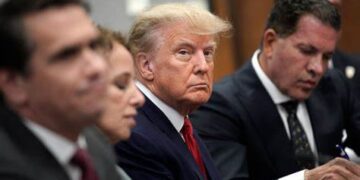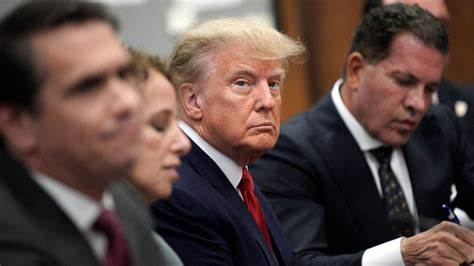Many far-right members of the Israeli government have openly supported former President Donald Trump’s potential return to the White House in the 2024 election. They perceive Trump as providing them with unlimited weapons and showing little concern for the events in Gaza.
Contrasting this, Vice President Kamala Harris, the likely Democratic nominee, might align with President Biden or show greater sympathy towards a potential Palestinian state. Although support for Israel’s defense will certainly continue, it may be subject to specific conditions.
While Prime Minister Benjamin Netanyahu did not seek my advice, the prospect of either Trump returning to the White House or Harris becoming the first female president after 248 years presents a potential challenge for Israel. Despite both Harris and Trump having a profound understanding of the Prime Minister and the regional dynamics, new leadership would likely adopt a different strategy than the Biden administration.
Given the information available, it would be prudent for Prime Minister Netanyahu to endeavor to finalize the agreement developed by President Joe Biden’s team. With significant input from Israeli officials and regional allies, this deal has the potential to secure a peaceful and stable future for Israel. With endorsements from the US, Israel, regional partners, and the United Nations, the agreement stands to forge a clear path to prosperity and strengthen ties with Saudi Arabia.
Trump’s temperament and lack of interest in global policy, coupled with Christian nationalism, present a complex political landscape.
Netanyahu’s visit to Florida is frequently overlooked as an effort to repair relations with Trump. This followed Netanyahu’s congratulatory message to President Joe Biden on his 2022 election win, which the former president viewed as a betrayal by the prime minister.
Donald Trump has repeatedly claimed that if he were president, the October 7th attack on Israel and Russia’s invasion of Ukraine would not have occurred. However, he has not provided details on how he would have prevented these events, which may be worrisome to Israeli officials.
It is noteworthy that Trump’s first impeachment took place during his presidency after he delayed bipartisan Congressional aid to Ukraine. This was because their president would not assist in gathering political dirt on an opponent, a violation of U.S. law that prohibits soliciting a foreign government to investigate a political rival. The incident involving the call to Ukraine occurred one day after the FBI Director testified on Capitol Hill that Russia had interfered in the 2016 presidential election.
In 2019, then-President Trump asked Ukrainian President Volodymyr Zelensky to investigate his political opponent, then-Democratic presidential candidate and Vice President Joe Biden, along with Biden’s son, Hunter. Trump pressed the Ukrainian leader to delve into Biden’s 2016 request for the removal of the country’s chief prosecutor, who had been investigating a Ukrainian natural gas company associated with Hunter Biden.
Zelensky promised Trump to look into the Ukrainian prosecutor’s actions and pondered his replacement, yet he refused to investigate the Bidens due to insufficient evidence of misconduct. Discontent with Zelensky’s stance, Trump held back aid, releasing it only when Congress exerted pressure.
If I were Netanyahu and the Israeli government, I would exercise caution in supporting Trump. It is worrisome when the stability of a relationship with the United States depends on the temperament of a president who prioritizes personal allegiance over objective cooperation.
American Jews Concerned About Christian Nationalism and Trump
Friday night approximately four hours after Prime Minister Netanyahu concluded his meeting with Trump, presumably enjoying a pleasant Shabbat meal with his son in Miami, President Trump was back in Palm Beach at a significant gathering crucial to his election campaign.
He was the keynote speaker at The Believers Summit, an evangelical Christian event taking place in West Palm Beach on Friday evening. The former president was well aware of his audience’s favorite issues and spoke on topics they were eager to hear about, including the reversal of Roe v. Wade, transgender matters, and other socially conservative issues that energized the attendees.
Numerous Jewish leaders in the US find Trump’s backing of Christian Nationalists deeply concerning due to their ties with White Supremacy and Alt-Right factions. They perceive it as a move towards authoritarianism, a diminishment of religious freedom, and a validation of a Christian Nationalist movement they consider inherently antisemitic. They contend that this has resulted in a marked increase in antisemitism, which they attribute directly to Trump’s initial four-year term as president.
Christian Nationalism may benefit Israel, but only a small segment of Americans favor the concept.
According to a Pew Research poll conducted in February, two-thirds of U.S. adults believe that churches should refrain from political involvement, underscoring the significance of the separation between religion and government. Thus, it appears to be an effort by the hard right in the United States for the minority to impose their agenda on the majority of Americans.
Christian Nationalists maintain that the United States fundamentally embodies Christian values and has strayed from these principles. They contend that resolute actions are imperative to reinstate these values as the foundation of the nation’s governance and social standards.
With Trump in office, Christian Nationalists aim to leverage political power to dismantle the separation of church and state—the fundamental principle that guarantees religious freedom—and to align laws on social issues more closely with Evangelical doctrine. This could lead to the prohibition of abortion and same-sex marriage, and restrict access to contraceptives. Additionally, it might result in more legislation similar to Louisiana’s recent law mandating the display of the Ten Commandments in public school classrooms.
American Jews and Project 2025
Once again, we see a scenario where a minority seeks to dominate the majority. Recent polls indicate that 64% of Americans are aware of Project 2025. Yet, of those with knowledge of the project, merely 11% have a favorable view, whereas 48% possess an unfavorable stance.
Project 2025, also referred to as the Presidential Transition Project, comprises a set of policy proposals designed to reform the U.S. federal government following a Republican win in the 2024 presidential election. Orchestrated by the conservative think tank The Heritage Foundation and nearly 30 other conservative groups, the initiative seeks to establish a “government-in-waiting” for the forthcoming Republican administration, aiming to “institutionalize Trumpism.”
While Trump tries to dissociate himself from the plan, a glance back at a 2022 speech reveals that during a Heritage Foundation event, Trump stated, “This is a great group and they’re going to lay the groundwork and detail plans for exactly what our movement will do … when the American people give us a colossal mandate to save America.”
That mandate is ready to go and it appears that at least 140 individuals who were part of the Trump administration contributed to Project 2025, including over half of those credited as authors, editors, and contributors to ‘Mandate for Leadership,’ the project’s comprehensive plan for transforming the executive branch. Among these 140 are Russ Vought, former Office of Management and Budget Director; Christopher Miller, former acting Defense Secretary; Ben Carson, former Housing and Urban Development Secretary; Rick Dearborn, former deputy chief of staff; Gene Hamilton, former Justice Department senior counsel; and presidential advisors such as Stephen Miller, John McEntee, Jonathan Berry, Ken Cuccinelli, and Peter Navarro.
At first glance, Project 2025 might seem beneficial to Israel, but many American Jews view it primarily as an effort to protect the birthplace of Jesus, rather than as an act of goodwill towards the Jewish community, especially since their beliefs indicate otherwise.
Project 2025 outlines that “it is in the U.S. national interest to establish a Middle East security pact including Israel, Egypt, the Gulf states, and potentially India,” emphasizing the importance of “protecting freedom of navigation” in the Gulf, Red Sea, and Suez Canal as crucial for the global economy and “U.S. prosperity.” Specifically, on page 294, it states the goal to “advance the Abraham Accords,” which refers to the normalization of relations between Israel and Gulf states initiated during the Trump Administration. The document also supports the inclusion of Saudi Arabia, aligning with efforts by the Biden administration prior to October 7.
Trump’s Lack of Ability to Build a Coalition
Washington based CEO & Founder of LJC. Media covering politics, sports, & entertainment A seven-time Emmy Award-winning TV producer, director, and podcast host. Digital Director and Washington Bureau Chief at News Talk Florida & The Daily Cable
























































